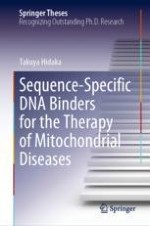This book describes the author’s work on the development of sequence-specific DNA binders for the therapy of mitochondrial diseases. In the first chapter, the author provides a detailed background of pyrrole–imidazole polyamides (PIPs) and mitochondrial disease research followed by chapters presenting the author's own research and discoveries. Firstly, the developed compounds called MITO-PIPs, which recognize specific sequences in mitochondrial DNA, are presented. The following chapter demonstrates how, by introducing a DNA alkylating reagent into a MITO-PIP that recognizes the adjacent sequence to a target mutation, the copy number of mutated mitochondrial DNA was successfully reduced in live cells. Furthermore, because nuclear DNA is another important target for treating mitochondrial diseases, the author demonstrated that tri-arginine vectors can enhance nuclear uptake of PIPs and improve their biological activity in cells.
This work will attract readers’ interest because it paves the way for a transgene-free chemical gene therapy for mitochondrial diseases. The book includes a detailed description of experimental procedures, especially compound synthesis. This description helps readers to have a clear image of the author’s studies and to perform similar and extended studies themselves.
